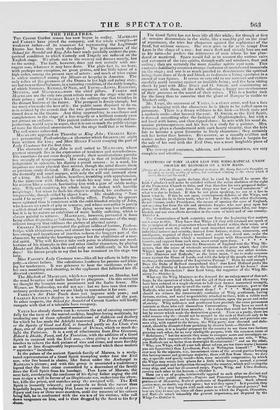SYMPTOMS OF TORY ALARM LEST TIIE WHIG-RADICAL UNION SHOULD BE RESTORED ON A NEW BASIS.
[Fragm, nts from the Times ; whhh greeted to dismiss Mr. Henry Bulicer's Pamphlet. on Tuesday. as hardly worthy notice. but continued ciratiny to the chord which it strech,througl,out the week.]
. . . . O'Connell again declares that he (and by himself he means the Irish ('atholics) will never be satisfied without the entire abolition of the right of the Protestant Church to tithe, and that therefore his own proposed deduction of 42/. 10s. per cent. from the clergy was but a " small instalment " of what svas due to Ireland. If this be not plain speaking, we are at a loss to know what is. If this he not open, contemptuous defiance of the Whigs, and giving them the lie in their teeth, what is ? But if this, with other disclosures, do not hecomc, under Providence, the means of opening the eyes of England, and rescuing her from the vile and atrocious harpies who now prey upon her glory, her welfare, and her peace, then are our anticipations false, our hopes blasted, and our own efforts nerveless in the cause of truth and of our country. °dolor 4.
The Conservatives of both countries saw from the beginning that matters must come to this. They knew that Whigs (if they still retained one spark of the principles of those progenitors whose blood flowed within their veins, or if they professed even the rudest and most imperfect sense of what their own individual interest and security, derived from fortune, station, connexion, and intelligence, required of them) would not, could not, dared not, make the immeasurable sacrifices which a continued league with Democratic Revolutionists, and support front such men, must entail upon them. • * • • • Never until this moment have the Democrats of England told the Whig Ministers, that the crime of wholesale revolution is the price which they (the Whigs) must pay for the retention of their seats during one other session. " The Ministers and Radicals," as the latter insist, " are to make common cause against the House of Lords, and with the help of the people out of doors, to change the constitution of the Legislative Peerage." Have we said enough? Does the Duke of Bedford comprehend this? does Lord Holland prefer the seals uf the Dutchy of Lancaster to the hereditary coronet of his house? does the Duke of Devonshire? does Lord Grey, the supporter of the Whig Ministry ?— October 5. What say the Whig Ministers to the demand for an enlargement of that suffrage, by the operation of which, and the aid of their own bad character, they have been reduced at a single election to half their former numerical strength, part of which have gone to swell the ranks of the Conservatives, part to the Radicals, who now bully and torment diem ? • • • • With great pain should we witness the irrecoverable confusion of Whig gentlemen, having fortune, station, and social respectability attached to them, with a rabble rout of desperate projectors, and reckless expo imentalists, upon the peace and order of society. Whig noblemen and gentlemen have precisely the same permanent interests as those who call themselves Conservatives. 'They have as much to lose from revolution and from anarchy. As a class they could not. be destroyed but by events which made the destruction general. Even as a party, there are solid reasons why should not he merged in the mob of Radicals only to be the next hour trampled on by them. There are many public and patriotic reasons why, with regard to the future, the Whig party, now diseased and dislocated, should be dissuaded from perishing by its own hand.— October 6. To be sure, it is a hopeful prospect for the country to see these two factions greasing each other, for no very intelligible purpose, with the .conanon name of " Reformers;" but the minute they come to compare notes and investigate reciprocally their respective titles to the epithet, exclaiming on one side, " Why, you Radicals are no better than downright Revolutionists ! " and on the other, " Why, you Whigs, with all your talk about reform, are ten t. .s worse (because you are hypocrites) than Lyndhurst, Peel, 'or Wellington himself ! " Whatever may be the separate, nay, inconsistent views of the several parties forming
this heterogeneous and grotesque majority, there will flow from them, we dare
say, a specific and speedy result—first, some miserable compromise, by which the Whigs may retain their places for a little while longer; second, a general burst of contempt and indignation throughout the country, which will swamp the crazy ship, and send her ill-assorted cargo, Papist, Whig, and Ultra-Radical, cursing each other to the bottom.— October 7. Here are a set of people, intrinsically opposed to each other on distinct and irreconeealde public grounds—Papista and l'rotestant Independents, Whig professors of Monarchy, Radical professors of Republicanism. Such adverse earties may, no doubt, say they agree ; but will they agree ? Is it possible they should.? T hey may bargain with each other to stir " no disputed points r but how are they to maoage, when all those points to which the Papists, Dissenters, and Radicals attach ostensibly the gravest importance, are disputed by the Whigs ?— October S.


























 Previous page
Previous page